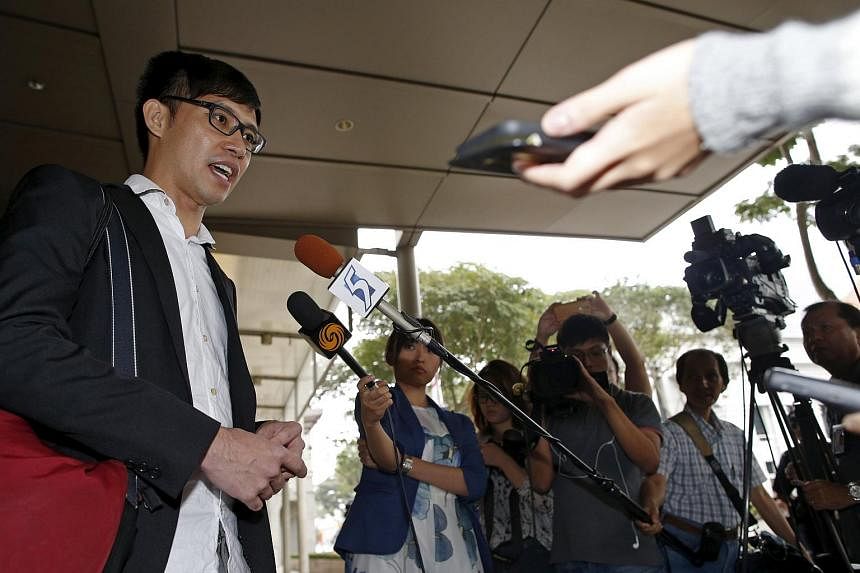Blogger Roy Ngerng yesterday claimed he did not know the meaning of the word "misappropriated" and that it had criminal implications.
But Senior Counsel Davinder Singh pointed out that the blog posts of the 34-year-old showed he knew he was accusing Prime Minister Lee Hsien Loong of criminal mishandling of Central Provident Fund savings.
The blog posts included the defamatory post of May 15 last year that suggested Mr Lee had misappropriated Singaporeans' CPF savings, as Mr Ngerng had likened Mr Lee to City Harvest Church (CHC) leaders, who are being prosecuted for alleged misuse of $50 million in church funds.
The posts showed he was aware of the allegations made against those involved in the CHC case, said Mr Singh, who is representing Mr Lee. Hence, Mr Ngerng must have known the implications that any comparison made in his post would have on Mr Lee's character, Mr Singh argued.
Mr Ngerng had insisted that he used the word only after coming across it in a Channel NewsAsia (CNA) article, and that he did not realise it had criminal implications.
"I understand that (the CNA article) said (the City Harvest Church leaders) misappropriated funds but I didn't understand the definition of misappropriation in the legal sense," he told the court.
-
On the sincerity - or otherwise - of Ngerng's apologies
-
This is an extract of the exchange in the High Court yesterday when Senior Counsel Davinder Singh (DS) was cross-examining blogger Roy Ngerng (RN).
Davinder Singh: I suggest to you, Mr Ngerng, that the word "apology" is completely meaningless to you. Do you agree or disagree?
Roy Ngerng: I do not agree...
DS: Every time you get caught, you apologise for convenience, but you carry on doing what you have always intended to do.
RN: No, that is not true.
DS: We have seen from your conduct, in less than 10 days from the date of the (letter of) demand - May 18 to May 27 - that when you were caught libelling, you apologised. But you continued to post the letter of demand with the offending words. When you were caught with the YouTube video, you apologised, but you privatised it and sent it out to editors. When you were caught with the e-mails, you apologised, and you said it was a momentary lapse of judgment, when today you accept that it wasn't.
RN: Huh? I said it was.
DS: In this court, you have used the word apology so many times that, really Mr Ngerng, it's quite clear that it's purely tactical and completely insincere.
RN: I disagree... As the PM admitted (on Tuesday), the four articles and YouTube video did not mention his name in a defamatory light, nor the allegation. The two e-mails (to the media) also referred to corruption or the Government's use of CPF funds. It was not about Mr Lee's use of CPF funds. In the first e-mail, there is a link... to the re-publication of the offending words and images and for that I have apologised...
The apology remains. As much as I acknowledge the four articles and video are not aggravating and do not repeat the libel, I took them down because I did not want to aggravate the issue.
The e-mails refer to the corruption in the Government. But we panicked because the Government, the PM sent another e-mail and we did not want him to think that we wanted to aggravate the issue. That's why I also sent that letter to apologise.
At no point was the apology less sincere. Because... I do not believe, I mean, there's no way I can prove it, except to say I do not believe Mr Lee has ever misappropriated CPF funds because I do not have evidence of that. I am not going to make any allegation of that... I am telling you here, now, there is still no intent with wanting to say it was Mr Lee who was using our CPF funds...
I would draw the line between the Government's use of CPF funds and what I say about how the Government uses it, with how you want to insinuate that I'm talking about the PM. Because they are two very separate things. Just as how the defamatory suit and the CPF are two very separate things. So please let us keep the line clear because if you keep crossing (it), sometimes I miss it; I admit to something, then I make myself look guilty when I'm actually admitting to something that I should not be admitting.
Justice Lee, in a summary judgement last November, had found the May 15 blog post defamatory.
In it, Mr Ngerng had replicated a chart in a CNA article, but replaced the image of CHC founder Kong Hee with that of PM Lee, and the images of the other accused CHC leaders with those of prominent people such as Deputy Prime Minister Tharman Shanmugaratnam and Temasek Holdings chief executive Ho Ching. Beneath the chart, he wrote: "Meanwhile, something bears an uncanny resemblance to how the money is being misappropriated."
Yesterday, Mr Ngerng insisted he used the chart only because it was "a good way to explain" how the Government invested CPF monies.
He also said he did not understand the gravity of using the word "misappropriated" until he received Mr Singh's letter of demand to take down the defamatory post.
But Mr Singh charged that it would have been clear to Mr Ngerng that the word "misappropriated" - as it appeared in the CNA article and on which he based his blog post - was used in relation to allegations of dishonesty.
"You have agreed that when people are accused of something, there are charges. You have agreed that one of the charges that had been levelled at them was misappropriation. And so would you agree that, from this article, that misappropriation is a crime?"
Said Mr Ngerng: "If you put it this way, then yes."


